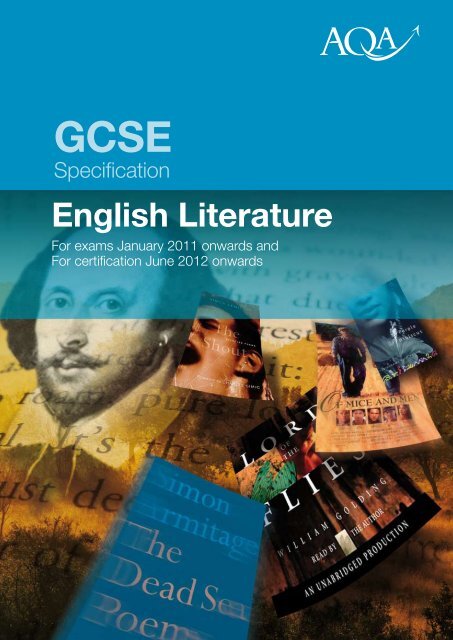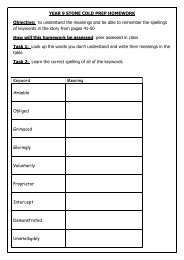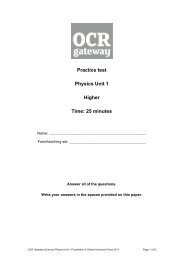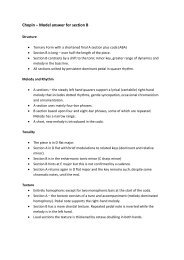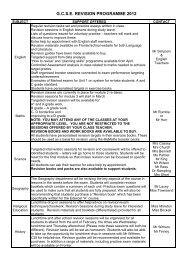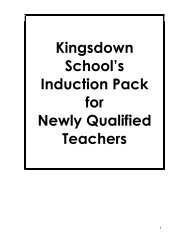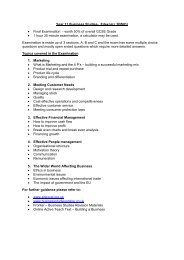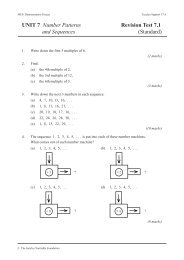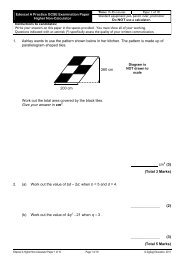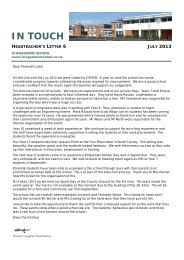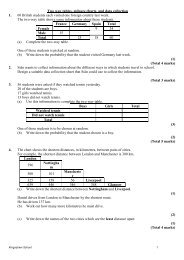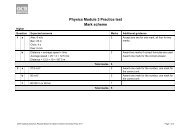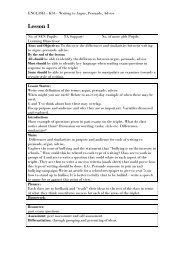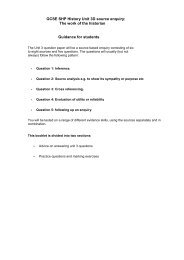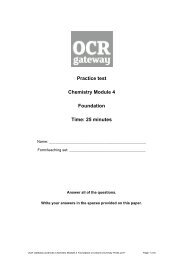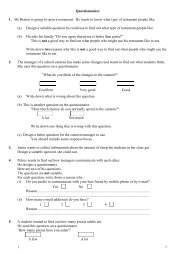GCSE English Literature Specification - Kingsdown School
GCSE English Literature Specification - Kingsdown School
GCSE English Literature Specification - Kingsdown School
You also want an ePaper? Increase the reach of your titles
YUMPU automatically turns print PDFs into web optimized ePapers that Google loves.
<strong>GCSE</strong><br />
<strong>Specification</strong><br />
<strong>English</strong> <strong>Literature</strong><br />
For exams January 2011 onwards and<br />
For certification June 2012 onwards
<strong>GCSE</strong><br />
<strong>Specification</strong><br />
<strong>English</strong> <strong>Literature</strong><br />
4710
Our specification is published on our website (http://www.aqa.org.uk). We will let centres know in writing about<br />
any changes to the specification. We will also publish changes on our website. The definitive version of our<br />
specification will always be the one on our website, this may differ from printed versions.<br />
You can get further copies of this specification from:<br />
AQA Logistics Centre (Manchester)<br />
Unit 2<br />
Wheel Forge Way<br />
Ashburton Park<br />
Trafford Park<br />
Manchester<br />
M17 1EH<br />
Or, you can download a copy from our website (www.aqa.org.uk)<br />
Copyright © 2009 AQA and its licensors. All rights reserved.<br />
Copyright<br />
AQA retains the copyright on all its publications, including the specifications. However, registered centres for<br />
AQA are permitted to copy material from this specification booklet for their own internal use.<br />
The Assessment and Qualifications Alliance (AQA), is a company limited by guarantee, registered in England<br />
and Wales (company number 3644723), and a registered charity (number 1073334).<br />
Registered address:<br />
AQA<br />
Devas Street,<br />
Manchester<br />
M15 6EX<br />
Dr Michael Cresswell, Director General.
<strong>GCSE</strong> <strong>English</strong> <strong>Literature</strong> 2010 specification (version 1.1)<br />
Contents<br />
1 Introduction 2<br />
1a Why choose AQA? 2<br />
1b Why choose <strong>GCSE</strong> <strong>English</strong> <strong>Literature</strong>? 3<br />
1c How do I start using this specification? 4<br />
1d How can I find out more? 4<br />
2 <strong>Specification</strong> at a Glance 5<br />
3 Subject Content 8<br />
3a Unit 1: Exploring modern texts 8<br />
3b Unit 2: Poetry across time 10<br />
3c Unit 3: The significance of Shakespeare and the <strong>English</strong> Literary Heritage 11<br />
3d Unit 4: Approaching Shakespeare and the <strong>English</strong> Literary Heritage 14<br />
3e Unit 5: Exploring poetry 15<br />
4 Scheme of Assessment 18<br />
4a Aims and learning outcomes 18<br />
4b Assessment Objectives 18<br />
4c National criteria 19<br />
4d Centres in Wales 19<br />
4e Previous learning requirements 20<br />
4f Access to assessment: diversity and inclusion 20<br />
5 Administration 21<br />
5a Availability of assessment units and certification 21<br />
5b Entries 21<br />
5c Private candidates 21<br />
5d Access arrangements, reasonable adjustments and special consideration 22<br />
5e Examination language 22<br />
5f Qualification titles 22<br />
5g Awarding grades and reporting results 23<br />
5h Re-sits and how long unit results remain available to count<br />
towards certificaton 24<br />
6 Controlled Assessment administration 25<br />
6a Authenticating that controlled assessment work is genuine 25<br />
6b Malpractice 25<br />
6c Teacher standardisation 26<br />
6d Internal standardisation of marking 26<br />
6e Annotation of Controlled Assessment work 26<br />
6f Submitting marks and sample work for moderation 26<br />
6g Factors affecting individual candidates 27<br />
6h Keeping candidates’ work 27<br />
7 Moderation 28<br />
7a Moderation procedures 28<br />
7b Consortium arrangements 28<br />
7c Procedures after moderation 28<br />
Appendices 29<br />
A Grade descriptions 29<br />
B Spiritual, moral, ethical, social, legislative, sustainable development,<br />
economic and cultural issues and health and safety considerations 30<br />
C Overlaps with other qualifications 31<br />
D Wider Key Skills – Teaching, developing and providing opportunities<br />
for generating evidence 32<br />
E Contents of the AQA Anthology Moon on the Tides 33<br />
F Lists of authors from the National Curriculum KS4 programme of study 34<br />
G Assessment Criteria for Controlled Assessment 35<br />
1
<strong>GCSE</strong> <strong>English</strong> <strong>Literature</strong> 2010 specification (version 1.1)<br />
1 Introduction<br />
1<br />
1a<br />
Why choose AQA?<br />
We, AQA, are the United Kingdom’s favourite<br />
awarding body and more students get their academic<br />
qualifications from us than from any other board. But<br />
why are we so popular?<br />
We understand the different requirements of<br />
each subject by working with teachers.<br />
Our <strong>GCSE</strong>s:<br />
help students achieve their full potential<br />
are relevant for today’s challenges<br />
are manageable for schools and colleges<br />
are easy to understand by students of all levels<br />
of ability<br />
lead to accurate results, delivered on time; and<br />
are affordable and value for money.<br />
We provide a wide range of support services for<br />
teachers, including:<br />
access to subject departments<br />
training for teachers, including practical<br />
teaching strategies and methods that work,<br />
presented by senior examiners<br />
individual support for Controlled Assessment<br />
24-hour support through our website and<br />
online with Ask AQA<br />
past question papers and mark schemes<br />
a wide range of printed and electronic<br />
resources for teachers and students<br />
free online results analysis, with Enhanced<br />
Results Analysis.<br />
We are an educational charity focused on the needs<br />
of the learner. All our income is spent on improving<br />
the quality of our specifications, examinations and<br />
support services. We don’t aim to profit from<br />
education, we want you to.<br />
If you are already a customer we thank you for your<br />
support. If you are thinking of joining us we look<br />
forward to welcoming you.<br />
2
<strong>GCSE</strong> <strong>English</strong> <strong>Literature</strong> 2010 specification (version 1.1)<br />
Subject Content<br />
8 Summary of Subject Content<br />
1b<br />
Why choose <strong>GCSE</strong> <strong>English</strong> <strong>Literature</strong>?<br />
This specification allows candidates to<br />
experience a range of <strong>Literature</strong> with a wide<br />
variety of appeal drawn from contemporary<br />
and modern texts, texts from across the globe<br />
and texts which have had a significant<br />
influence on our <strong>English</strong> (Welsh or Irish) literary<br />
and cultural heritage.<br />
Candidates will experience a range of literary<br />
genres. There is some flexibility for teachers to<br />
emphasise particular genres, thereby meeting<br />
the needs of their own candidates.<br />
The specification is based on a skills-based<br />
approach to the study of <strong>Literature</strong>. This<br />
enables candidates to make ‘fresh’ and<br />
individual responses to each element of<br />
assessment.<br />
The specification is most suitable for those<br />
who wish to explore <strong>English</strong> <strong>Literature</strong> in more<br />
depth, and (in combination with <strong>English</strong><br />
Language) experience greater breadth of<br />
<strong>English</strong> studies at this level.<br />
The scheme of assessment is unitised, offering<br />
flexibility. This enables centres to take varied<br />
routes in preparing candidates for assessment.<br />
Candidates can be entered when they are<br />
ready to be assessed and may re-sit each<br />
individual unit. The specification has two<br />
examined units, which do not have to be taken<br />
in the same series, and one Controlled<br />
Assessment unit.<br />
All candidates will study a modern prose OR<br />
drama text, with modern being defined as post<br />
-1945; a point at which a discernable shift in<br />
culture is evident. Some contemporary<br />
authors are included in these selections and<br />
the selection also introduces literary non-fiction<br />
to the set text choices.<br />
All candidates will respond to global <strong>Literature</strong>.<br />
They will make reference to universality as well<br />
as ‘difference’, recognising that <strong>Literature</strong> has<br />
the power to cross cultures.<br />
All candidates will also respond to<br />
Shakespeare, the <strong>English</strong> Literary Heritage<br />
(ELH) and to poetry. This specification offers<br />
two routes for candidates to cover this part of<br />
the course.<br />
In Route A poetry is assessed externally and<br />
Shakespeare and the <strong>English</strong> Literary Heritage (ELH)<br />
assessed internally. The internal assessment of<br />
Shakespeare allows candidates to explore stage and<br />
screen productions.<br />
Route B reverses this so that Shakespeare and the<br />
ELH are assessed externally and poetry is assessed<br />
internally. This allows candidates to engage creatively<br />
with poetry in performance.<br />
Candidates will learn how to approach the<br />
study of <strong>Literature</strong> and how to make engaged<br />
personal responses to texts.<br />
The Controlled Assessment for this<br />
specification offers an opportunity to enrich<br />
candidates’ experience of <strong>Literature</strong> through<br />
the study of multi-modal versions of the texts,<br />
for example, stage, film and audio versions.<br />
This should illuminate their study of the written<br />
texts.<br />
The AQA Anthology Moon on the Tides is<br />
available for use in either the external or<br />
internal assessment of poetry. The AQA<br />
Anthology Sunlight on the Grass contains one<br />
collection of modern stories which may be<br />
used for the external examination as an<br />
alternative to the set texts in Unit 1.<br />
At KS4, this specification must be taken<br />
alongside <strong>GCSE</strong> <strong>English</strong> Language. Post-16,<br />
candidates may enter <strong>GCSE</strong> <strong>English</strong> <strong>Literature</strong><br />
as a stand-alone qualification.<br />
This specification prepares candidates for GCE<br />
<strong>English</strong> <strong>Literature</strong>.<br />
The specification has been developed in<br />
consultation with practising teachers and<br />
subject associations.<br />
1<br />
3
<strong>GCSE</strong> <strong>English</strong> <strong>Literature</strong> 2010 specification (version 1.1)<br />
1c<br />
How do I start using this specification?<br />
1<br />
To ensure you receive all the teaching and<br />
examination material, it is important that the person<br />
responsible for making the decision to teach AQA<br />
informs both AQA and their Exam Officer.<br />
Step one:<br />
To confirm you will be teaching this specification goto<br />
www.aqa.org.uk/signup and complete the online<br />
form. You will then receive your free <strong>GCSE</strong> <strong>English</strong><br />
<strong>Literature</strong> welcome pack(s) that contain teaching and<br />
support material.<br />
Step two:<br />
Inform your Exam Officer of your choice<br />
to ensure you receive all your examination material.<br />
Your Exam Officer will make sure that your centre is<br />
registered with AQA and will complete the Intention to<br />
Enter and Estimated Entries when required<br />
to do so.<br />
If your centre has not used AQA for any examinations<br />
in the past, please contact our centre approval team<br />
at centreapproval@aqa.org.uk.<br />
1d<br />
How can I find out more?<br />
You can choose to find out more about this<br />
specification or the services that AQA offers in a<br />
number of ways.<br />
Ask AQA<br />
You have 24-hour access to useful information and<br />
answers to the most commonly asked questions at<br />
www.aqa.org.uk/askaqa<br />
If the answer to your question is not available, you<br />
can submit a query through Ask AQA for our team.<br />
We will respond within two working days.<br />
Speak to your subject team<br />
You can talk directly to the <strong>GCSE</strong> <strong>English</strong> <strong>Literature</strong><br />
subject team about this specification either by e-<br />
mailing english-gcse@aqa.org.uk or by calling<br />
0161 953 1180.<br />
Teacher Support meetings<br />
Details of the full range of our Teacher Support<br />
meetings are available on our website at<br />
www.aqa.org.uk/support/teachers.php<br />
There is also a link to our fast and convenient online<br />
booking system for Teacher Support meetings at<br />
events.aqa.org.uk/ebooking<br />
If you need to contact the Teacher Support team, you<br />
can call us on 01483 477860 or e-mail us at<br />
teachersupport@aqa.org.uk<br />
Latest information online<br />
You can find out more including the latest news, how<br />
to register to use Enhanced Results Analysis, support<br />
and downloadable resources on our website at<br />
www.aqa.org.uk<br />
4
<strong>GCSE</strong> <strong>English</strong> <strong>Literature</strong> 2010 specification (version 1.1)<br />
2 <strong>Specification</strong> at a Glance<br />
Candidates must take Route A or Route B:<br />
Route A or Route B<br />
Unit 1 Unit 1<br />
+ +<br />
Unit 2 Unit 4<br />
+ +<br />
Unit 3 Unit 5<br />
Unit 1: Exploring modern texts<br />
2<br />
External examination<br />
40% of the total <strong>GCSE</strong> marks<br />
Section A: Modern prose or drama<br />
20% of the total <strong>GCSE</strong> marks<br />
Section B: Exploring cultures<br />
20% of the total <strong>GCSE</strong> marks<br />
1 hour<br />
30 mins<br />
60 marks<br />
45 mins 30 marks<br />
45 mins 30 marks<br />
EITHER<br />
OR<br />
Unit 2: Poetry across time<br />
External examination<br />
35% of the total <strong>GCSE</strong> marks<br />
Section A: Poetry cluster<br />
from the Anthology<br />
23% of the total <strong>GCSE</strong> marks<br />
Section B: Responding to<br />
an unseen poem<br />
12% of the total <strong>GCSE</strong> marks<br />
1 hour<br />
15 mins<br />
45 mins<br />
30 mins<br />
54<br />
marks<br />
36<br />
marks<br />
18<br />
marks<br />
Unit 4: Approaching Shakespeare<br />
and the <strong>English</strong> Literary Heritage<br />
External examination<br />
35% of the total <strong>GCSE</strong> marks<br />
Section A: Shakespeare<br />
20% of the total <strong>GCSE</strong> marks<br />
Section B: Prose from the<br />
<strong>English</strong> Literary Heritage<br />
15% of the total <strong>GCSE</strong> marks<br />
1 hour<br />
15 mins<br />
45 mins<br />
30 mins<br />
54<br />
marks<br />
30<br />
marks<br />
24<br />
marks<br />
Unit 3: The significance of<br />
Shakespeare and the <strong>English</strong><br />
Literary Heritage<br />
Unit 5: Exploring poetry<br />
Controlled Assessment<br />
25% of the total <strong>GCSE</strong> marks<br />
3 – 4<br />
hours<br />
40<br />
marks<br />
Controlled Assessment<br />
25% of the total <strong>GCSE</strong> marks<br />
3 – 4<br />
hours<br />
40<br />
marks<br />
Note that times indicate the production of written<br />
outcomes.<br />
Note that times indicate the production of written<br />
outcomes.<br />
5
<strong>GCSE</strong> <strong>English</strong> <strong>Literature</strong> 2010 specification (version 1.1)<br />
Summary of assessment<br />
Structure of units and examination papers<br />
Unit 1: Exploring modern texts<br />
Papers wil be available at F and H tiers<br />
2<br />
Section A:<br />
Candidates answer one question from a choice of two on each set text (30 marks).<br />
Section B:<br />
• Part a will ask candidates to respond to a passage from the text.<br />
Candidates answer one question on the set text they have<br />
studied. The question will be in two parts (30 marks). • Part b will ask candidates to link this passage to the whole text.<br />
Unit 2: Poetry across time<br />
Section A:<br />
Candidates answer one question, from a choice of two,<br />
on the poetry cluster they have studied. The question will<br />
ask candidates to compare a named poem with another<br />
poem, chosen by the candidate, from the cluster (36<br />
marks).<br />
Section B:<br />
Candidates are given one compulsory unseen poem.<br />
There will be a different poem on each tier.<br />
H Tier: Candidates answer one compulsory question<br />
about the poem (18 marks).<br />
F Tier: Candidates<br />
answer one<br />
compulsory question<br />
about the poem. The<br />
question will be in<br />
two parts (18 marks).<br />
• Part a will ask candidates<br />
about the ideas in the poem.<br />
• Part b will ask candidates to<br />
write about the methods used<br />
by the poet.<br />
Unit 3: The significance of<br />
Shakespeare and the <strong>English</strong><br />
Literary Heritage<br />
Candidates complete one Controlled Assessment task<br />
which asks them to make links between a play from<br />
Shakespeare and any other text, of any genre, from the<br />
<strong>English</strong> (or Welsh or Irish) Literary Heritage (40 marks).<br />
They may draw on multi-modal versions of the texts, for<br />
example stage productions, fi lm and/or audio versions to<br />
enrich and inform their understanding of the text.<br />
Unit 4: Approaching Shakespeare<br />
and the <strong>English</strong> Literary Heritage<br />
Papers will be available at F and H tiers<br />
Section A:<br />
Candidates answer one question from a choice of two on<br />
the Shakespeare set text they have studied. The question<br />
will be in two parts.<br />
Section B:<br />
Candidates answer one essay question from a choice of<br />
two on the set text they have studied (24 marks).<br />
Unit 5: Exploring poetry<br />
Candidates complete one Controlled Assessment task<br />
which asks them to make links between a range of<br />
poems which must cover contemporary poetry and poetry<br />
from the <strong>English</strong> (or Welsh or Irish) Literary Heritage.<br />
Poems from the AQA Anthology Moon on the Tides may<br />
be used for this unit (40 marks).<br />
They may draw on multi-modal versions of the poems, for<br />
example poetry in performance and/or audio versions to<br />
enrich and inform their understanding of the texts.<br />
Candidates may make their own audio and/or visual<br />
productions of poems in order to explore the language of<br />
the texts.<br />
Please refer to the Specimen Assessment Materials on aqa.org.uk for examples of examination<br />
papers and controlled assessment tasks for this specification.<br />
6
<strong>GCSE</strong> <strong>English</strong> <strong>Literature</strong> 2010 specification (version 1.1)<br />
Controlled Assessment<br />
There are three elements to Controlled Assessment:<br />
Task Setting: Who sets the task<br />
Task Taking: How the students perform the tasks<br />
Task Marking: Who does the marking.<br />
Each stage has a level of control (high, medium or low) to ensure reliability and authenticity and to make<br />
assessments more manageable for teachers and students.<br />
2<br />
AQA’s Controlled Assessment tasks have been designed to offer you maximum flexibility allowing<br />
you to:<br />
Choose texts<br />
Contextualise tasks to meet the needs of your students<br />
Timetable the assessment to meet your needs<br />
Offer assessment in January and June.<br />
7
<strong>GCSE</strong> <strong>English</strong> <strong>Literature</strong> 2010 specification (version 1.1)<br />
3 Subject Content<br />
This section covers the subject content of the five units:<br />
Unit 1: Exploring modern texts<br />
Unit 2: Poetry across time<br />
Unit 3: The significance of Shakespeare and the <strong>English</strong> Literary Heritage<br />
Unit 4: Approaching Shakespeare and the <strong>English</strong> Literary Heritage<br />
Unit 5: Exploring Poetry<br />
Each section provides a summary of what candidates have to do, the assessment process and answer to<br />
controlled assessment questions, where relevant.<br />
3a<br />
Unit 1: Exploring modern texts<br />
3<br />
Unit 1: Summary of what candidates have to do:<br />
In this unit candidates will study two modern texts,<br />
one of which will be based on exploring different<br />
cultures. Modern in this context is defined as post -<br />
1945. The modern texts in Section A provide an<br />
element of familiarity, either through themes and<br />
issues or through language. This allows candidates<br />
to engage with <strong>Literature</strong> before they move on to<br />
looking at texts that are more distanced from their<br />
own experience by place in Section B and then by<br />
time in the other units of this course.<br />
Candidates will be expected to consider:<br />
ideas, themes and issues<br />
characterisation<br />
settings.<br />
These must be underpinned by understanding the<br />
writers’ language and techniques.<br />
Section A offers a choice of ten texts which includes<br />
literary non-fiction and drama texts. This allows<br />
teachers to select the genre that is most suitable for<br />
their candidates.<br />
Section B offers a choice of four texts which explore<br />
different cultures. Candidates should explore aspects<br />
of the text that are specific to that culture as well as<br />
universal ideas.<br />
Prescribed Texts for Unit 1: Exploring<br />
modern texts<br />
Section A: Modern prose or drama<br />
1. Short Stories from the AQA Anthology Sunlight on<br />
the Grass<br />
My Polish Teacher’s Tie Helen Dunmore<br />
When the Wasps<br />
Drowned<br />
Claire Wigfall<br />
Compass and Torch Elizabeth Baines<br />
On Seeing the 100%<br />
Perfect Girl<br />
Haruki Murakami<br />
The Darkness Out There Penelope Lively<br />
Anil<br />
Ridjal Noor<br />
Something Old,<br />
Something New Leila Aboulela<br />
2. Lord of the Flies William Golding<br />
3. Martyn Pig Kevin Brooks<br />
4. Touching the Void Joe Simpson<br />
5. The Woman in Black Susan Hill<br />
6. Under Milk Wood Dylan Thomas<br />
7. The Crucible Arthur Miller<br />
8. Kindertransport Diane Samuels<br />
9. An Inspector Calls J B Priestley<br />
10.Deoxyribonucleic Dennis Kelly (AQA<br />
Acid (DNA)<br />
recommended edition)<br />
8
<strong>GCSE</strong> <strong>English</strong> <strong>Literature</strong> 2010 specification (version 1.1)<br />
Subject Content<br />
8 Summary of Subject Content<br />
Section B: Exploring cultures<br />
1. Of Mice and Men<br />
(America)<br />
2. Mister Pip (Papua New<br />
Guinea)<br />
John Steinbeck<br />
Lloyd Jones<br />
3. Purple Hibiscus Chimamanda Ngozi<br />
(Nigeria)<br />
Adichie<br />
4. To Kill a Mockingbird<br />
(America)<br />
Harper Lee<br />
Unit 1: Summary of assessment<br />
This unit is assessed by an external examination.<br />
3<br />
9
<strong>GCSE</strong> <strong>English</strong> <strong>Literature</strong> 2010 specification (version 1.1)<br />
3b<br />
Unit 2: Poetry across time<br />
Unit 2: Summary of what candidates have to do:<br />
3<br />
In this unit candidates will take a skills-based<br />
approach to poetry, learning how to make an<br />
informed personal response to a range of poems.<br />
They will be expected to respond to:<br />
ideas, themes and issues<br />
form and structure and language (including<br />
sound and imagery)<br />
in any poem, making them engaged and critical<br />
readers of poetry.<br />
This unit covers two texts: Contemporary Poetry and<br />
Poetry from the <strong>English</strong>, Welsh and Irish Literary<br />
Heritage.<br />
Section A is based on the study of a thematic poetry<br />
cluster from the AQA poetry Anthology Moon on the<br />
Tides. Each cluster contains fifteen poems, some of<br />
which are contemporary and some of which are from<br />
the ELH, WLH or ILH. Candidates will study one of<br />
these clusters in detail in order to respond to<br />
questions in Section A of the examination paper.<br />
Characters and voices<br />
Place<br />
Conflict<br />
Relationships<br />
Candidates will be expected to make comparisons<br />
across poems in the cluster they have studied.<br />
Section B asks candidates to respond to an unseen<br />
poem. In preparing for this section, candidates will<br />
study the equivalent of another complete cluster.<br />
They may draw on a range of poems from across the<br />
anthology clusters, or equivalent poems chosen by<br />
the teacher. You are advised to select poems which<br />
ensure coverage of a range of styles, themes and<br />
poetic genres such as sonnets, ballads and<br />
narratives.<br />
Unit 2: Summary of assessment<br />
This unit is assessed by an external examination.<br />
10
<strong>GCSE</strong> <strong>English</strong> <strong>Literature</strong> 2010 specification (version 1.1)<br />
Subject Content<br />
8 Summary of Subject Content<br />
3c<br />
Unit 3: The significance of Shakespeare and the <strong>English</strong><br />
Literary Heritage<br />
Unit 3: Summary of what candidates have to do:<br />
This unit will be assessed by means of Controlled<br />
Assessment. Candidates will submit one task<br />
chosen from the topics in this unit.<br />
Tasks will link candidates’ study of one play by<br />
Shakespeare with one other text from the <strong>English</strong><br />
(Welsh or Irish) Literary Heritage. This text can be<br />
from any genre, but must not be a text studied in any<br />
other unit of this course.<br />
You may contextualise tasks by choosing texts that<br />
meet the needs of your candidates.<br />
3<br />
Unit 3: Summary of assessment<br />
Task Setting (high control)<br />
Tasks will be set by AQA. Each year we will<br />
provide tasks for each of the topics covered in<br />
this unit:<br />
Themes and ideas<br />
Characterisation and voice<br />
Under each heading, tasks may be set on<br />
aspects such as:<br />
1. Themes and ideas<br />
conflict<br />
love<br />
family<br />
power<br />
2. Characterisation<br />
relationships<br />
heroes<br />
female or male characters<br />
comic characters<br />
Task Taking (medium control)<br />
Candidates must produce work totalling about<br />
2000 words in a period of up to four hours in<br />
response to the Controlled Assessment task.<br />
Task Marking (medium control)<br />
You must mark all Controlled Assessments<br />
using the criteria published on pages 36–37 of<br />
this specification. They will be moderated by<br />
AQA according to the procedures outlined in<br />
Section 7.<br />
Preparation and planning<br />
How do I approach preparation and planning?<br />
Having taught the topic(s)<br />
you should give candidates the relevant task(s)<br />
if you wish, you may give candidates a choice<br />
of tasks on the topic(s) you have taught<br />
you are advised to give the candidates the<br />
chance to practise writing in this form and to<br />
prepare ideas after you have given them the<br />
task(s)<br />
during this time candidates may make use of<br />
any further resources available in the school or<br />
college, including the Internet, to inform their<br />
preparation<br />
candidates must keep a record of all the<br />
primary and secondary sources<br />
(including websites) they use<br />
11
<strong>GCSE</strong> <strong>English</strong> <strong>Literature</strong> 2010 specification (version 1.1)<br />
3<br />
candidates must keep a record of any sources<br />
they use to assist you in authenticating work<br />
records should be kept in the form of a<br />
bibliography<br />
all this work should be completed under<br />
informal supervision.<br />
How do I prepare candidates for this unit?<br />
As the Controlled Assessment is worth 25% of the<br />
overall mark, you are advised to spend 25% of the<br />
teaching time available to you on the texts and topic<br />
you have chosen for this unit. You should prepare<br />
candidates for the Controlled Assessment task by<br />
teaching approaches to the chosen texts and topic.<br />
You should also ensure that candidates are familiar<br />
with the assessment criteria for the Controlled<br />
Assessment task and are aware of the weighting<br />
given to each assessment objective.<br />
Do you have Controlled Assessment Advisers?<br />
Yes. Controlled Assessment Advisers will be available<br />
to give advice on all aspects of the Controlled<br />
Assessment including the marking.<br />
What approaches will the tasks offer?<br />
The tasks will offer a variety of approaches. Tasks will<br />
consist of a single title and may have a number of<br />
bullet points which will help candidates to plan the<br />
structure of their writing.<br />
Which Assessment Objectives will the tasks<br />
address?<br />
The tasks will address all four Assessment Objectives<br />
for <strong>GCSE</strong> <strong>English</strong> <strong>Literature</strong>.<br />
Can the assessment be based on parts of texts?<br />
Candidates will be expected to consider whole texts<br />
in their response but the assessment can be based<br />
on parts of texts (eg a scene from a play, a chapter<br />
from a novel, a poem or short story from a collection).<br />
Are candidates expected to make links between the<br />
texts studied?<br />
Candidates will be expected to make links between<br />
the texts studied. This does not constitute detailed<br />
comparison between texts but should show that<br />
candidates are aware of the nature of the linkage, for<br />
example why a given theme is significant in both texts<br />
and whether the texts take a similar or different<br />
approach to this theme. Candidates can write about<br />
the texts separately but will be expected to draw links<br />
in their introduction and conclusion. Some<br />
candidates may wish to make more explicit links<br />
throughout.<br />
Can candidates study multi-modal versions of a<br />
text?<br />
Yes. This unit offers an opportunity to enrich<br />
candidates’ experience through the study of multimodal<br />
versions of the text, for example stage<br />
productions, film and audio versions. They may, for<br />
example, consider how directors have presented<br />
aspects of the text in one or more versions of the<br />
texts. This should be clearly linked to the written text<br />
and should illuminate the writers’ techniques.<br />
How often do tasks change?<br />
Tasks will be replaced each year and the same tasks<br />
will be available for assessment in January and June.<br />
When are tasks published?<br />
Tasks for the following two years’ assessment series<br />
will be made available to centres from 1st April. They<br />
will be published on e-AQA.<br />
Do candidates need to address social, cultural and<br />
historical context?<br />
Yes. This assessment requires candidates to address<br />
social, cultural and historical context. This should be<br />
integrated into the response to the question.<br />
Will exemplars be available?<br />
Exemplar texts will be provided to indicate how<br />
candidates can approach the tasks. The tasks will be<br />
designed, however, to allow teachers and candidates<br />
to use texts of their choice.<br />
Can I give candidates feedback?<br />
You may give feedback to individual candidates<br />
during the planning phase. Where this goes beyond<br />
general advice, this should be recorded on the<br />
Candidate Record Form.<br />
Can candidates work together?<br />
Candidates may work with others during the planning<br />
phase. So, for example, they may discuss their ideas<br />
in small groups or share resources found on the<br />
Internet, but each candidate must produce an<br />
individual response to the task.<br />
Production<br />
Can candidates take drafts into the assessment?<br />
No. Drafts may not be taken into the assessment.<br />
Brief notes made in the preparation stage may be<br />
taken into the assessment. These must be checked<br />
by the teacher to ensure that they are not plagiarised<br />
text and do not include a detailed planning grid or<br />
pre-prepared final draft. The notes should be<br />
submitted with the final piece for moderation.<br />
Can candidates use texts during the Controlled<br />
Assessment?<br />
Candidates must use clean, unannotated copies of<br />
texts during the assessment period.<br />
Can candidates work together during the assessment?<br />
While writing up their response, candidates must<br />
work independently and complete all work under<br />
formal supervision by a teacher or invigilator. You<br />
must record any feedback given to candidates during<br />
this phase on the Candidate Record Form.<br />
12
<strong>GCSE</strong> <strong>English</strong> <strong>Literature</strong> 2010 specification (version 1.1)<br />
Does the Controlled Assessment have to take place<br />
in one session?<br />
No. The time allowed for the Controlled Assessment<br />
may be divided to meet the timetabling requirements<br />
of your centre.<br />
What do we do if the assessment period is broken<br />
down into smaller sessions?<br />
Where sessions are subdivided the teacher or<br />
invigilator must collect all materials in at the end of<br />
each session and return them to candidates at the<br />
beginning of the next session. No feedback should<br />
be given on drafts prepared during the assessment<br />
period. Candidates may not bring any new materials<br />
into the room once this phase has started.<br />
Can candidates use a dictionary or a thesaurus?<br />
Yes. During the writing up of the Controlled<br />
Assessment, candidates are allowed access to a<br />
dictionary and thesaurus and to grammar and spell<br />
check programmes.<br />
Can PCs be used?<br />
The Controlled Assessment may be either<br />
handwritten or produced electronically. Candidates<br />
using laptops/PCs to write their Controlled<br />
Assessment cannot have access to the Internet,<br />
e-mail, floppy disks or memory sticks as this could<br />
breach the controlled conditions. If the assessment<br />
period is divided into a number of shorter sessions,<br />
centres should ensure that work is saved securely to<br />
ensure that candidates cannot amend or add to the<br />
saved material between sessions.<br />
What is collected at the end of the assessment?<br />
At the end of the Controlled Assessment, the teacher<br />
or invigilator must collect in all work, including the final<br />
piece of work for assessment and any drafts.<br />
How do I mark multi-modal submissions?<br />
If candidates have submitted visual or audio<br />
responses to support a written response the total<br />
submission should be marked holistically using the<br />
criteria outlined in Section 7. AQA will provide further<br />
guidance on marking multi-modal submissions.<br />
3<br />
13
<strong>GCSE</strong> <strong>English</strong> <strong>Literature</strong> 2010 specification (version 1.1)<br />
3d<br />
Unit 4: Approaching Shakespeare and the <strong>English</strong> Literary<br />
Heritage<br />
Unit 4: Summary of what candidates have to do:<br />
3<br />
In this unit, candidates will consider texts from the<br />
<strong>English</strong> Literary Heritage, one of which will be a play<br />
by Shakespeare. This unit allows candidates to<br />
appreciate why some texts have enduring appeal and<br />
how the social, historical and cultural context of the<br />
text informs its content.<br />
As in Unit 1, candidates will be expected to consider<br />
the key aspects of literary study:<br />
ideas, themes and issues<br />
characterisation<br />
settings.<br />
These must be underpinned by understanding the<br />
writers’ language and techniques. They should learn<br />
to make informed personal responses.<br />
Section A is based on the study of one Shakespeare<br />
play from a choice of five. Candidates will engage<br />
with the language in the play and will consider the<br />
dramatic devices used to engage an audience,<br />
showing a clear understanding that the text was<br />
written for performance.<br />
Section B offers a choice of five texts from the<br />
<strong>English</strong> Literary Heritage. These texts allow<br />
candidates to experience how writers have presented<br />
aspects of <strong>English</strong> society and culture and to<br />
appreciate the characteristic style of writers who have<br />
shaped <strong>Literature</strong>.<br />
Prescribed Texts for Unit 4:<br />
Approaching Shakespeare and the<br />
<strong>English</strong> Literary Heritage<br />
Section A: Shakespeare<br />
Macbeth<br />
Romeo and Juliet<br />
Much Ado About Nothing<br />
Twelfth Night<br />
Julius Caesar<br />
Section B: Prose from the <strong>English</strong><br />
Literary Heritage<br />
Pride and Prejudice<br />
Wuthering Heights<br />
Great Expectations<br />
The Withered Arm and<br />
other Wessex Tales<br />
Animal Farm<br />
Jane Austen<br />
Emily Brontë<br />
Charles Dickens<br />
Thomas Hardy<br />
George Orwell<br />
Unit 4: Summary of assessment<br />
This unit is assessed by an external examination.<br />
14
<strong>GCSE</strong> <strong>English</strong> <strong>Literature</strong> 2010 specification (version 1.1)<br />
3e<br />
Unit 5: Exploring poetry<br />
Unit 5: Summary of what candidates have to do:<br />
This unit will be assessed by means of Controlled<br />
Assessment. Candidates will submit one task<br />
chosen from the topics in this unit.<br />
Tasks will link candidates’ study of contemporary<br />
poetry with poems from the <strong>English</strong> (Welsh or Irish)<br />
Literary Heritage.<br />
Centres will contextualise tasks by choosing texts<br />
that meet the needs of their candidates. They may<br />
wish to use poems for the AQA poetry Anthology<br />
Moon on the Tides or they may wish to use a range<br />
of poems of their own choice.<br />
3<br />
Unit 5: Summary of assessment<br />
Task Setting (high control)<br />
Tasks will be set by AQA. Each year we will<br />
provide two tasks; one for each of the topics<br />
covered in this unit:<br />
Themes and ideas<br />
Aspects of genre and form<br />
Under each heading, tasks may be set on<br />
aspects such as:<br />
1. Themes and ideas<br />
conflict<br />
love<br />
family<br />
power<br />
2. Aspects of genre and form<br />
endings<br />
importance of parts to whole<br />
setting<br />
conventions<br />
genres<br />
Task Taking (medium control)<br />
Candidates must produce work totalling about<br />
2000 words in a period of up to four hours in<br />
response to the Controlled Assessment task.<br />
Task Marking (medium control)<br />
You must mark all Controlled Assessments<br />
using the criteria published on pages 36–37 of<br />
this specification. They will be moderated by<br />
AQA according to the procedures outlined in<br />
Section 7.<br />
Preparation and planning<br />
How do I approach preparation and planning?<br />
Having taught the topic(s):<br />
you should give candidates the relevant task(s)<br />
if you wish, you may give candidates a choice<br />
of tasks on the topic(s) you have taught<br />
you are advised to give the candidates the<br />
chance to practise writing in this form and to<br />
prepare ideas after you have given them the<br />
task(s)<br />
during this time candidates may make use of<br />
any further resources available in the school or<br />
college, including the Internet, to inform their<br />
preparation<br />
they must keep a record of all the primary and<br />
secondary sources (including websites) they<br />
use<br />
they must keep a record of any sources they<br />
use to assist you in authenticating work<br />
records should be kept in the form of a<br />
bibliography<br />
all this work should be completed under<br />
informal supervision.<br />
15
<strong>GCSE</strong> <strong>English</strong> <strong>Literature</strong> 2010 specification (version 1.1)<br />
3<br />
How do I prepare candidates for this unit?<br />
As the controlled assessment is worth 25% of the<br />
overall mark, you are advised to spend 25% of the<br />
teaching time available to you on the texts and topic<br />
you have chosen for this unit. You should prepare<br />
candidates for the Controlled Assessment task by<br />
teaching approaches to the chosen texts and topic<br />
before giving the task to candidates.<br />
You should also ensure that candidates are familiar<br />
with the assessment criteria for the Controlled<br />
Assessment task and are aware of the weighting<br />
given to each assessment objective.<br />
Do you have Controlled Assessment Advisers?<br />
Yes. Controlled Assessment Advisers will be available<br />
to give advice on all aspects of the Controlled<br />
Assessment including the marking.<br />
What approaches will the tasks offer?<br />
The tasks will offer a variety of approaches. Tasks will<br />
consist of a single title or may have a number of bullet<br />
points which will help candidates to plan the structure<br />
of their writing.<br />
How many poems should candidates consider in<br />
the assessment?<br />
Candidates will be expected to consider two whole<br />
texts in their response. A whole poetry text is made<br />
up of fifteen poems. The assessment can be based<br />
on a smaller number of poems. Candidates should<br />
be encouraged to make creative links, choosing their<br />
own poems from the range studied. They must write<br />
about poems from both periods (contemporary and<br />
the Literary Heritage) in their response.<br />
Are candidates expected to make links between the<br />
texts studied?<br />
Candidates will be expected to make links and draw<br />
comparisons between the texts studied.<br />
Do students need to address social, cultural and<br />
historical context?<br />
No. There is no requirement for candidates to assess<br />
social, historical or cultural context in this unit.<br />
What does multi-modal texts mean?<br />
Candidates can be encouraged to take creative<br />
approaches to studying poetry, drawing on audio or<br />
audio-visual performances wherever possible. For<br />
example, in considering how the persona of a<br />
narrator is conveyed through performance. They may<br />
also, for example, produce their own audio or audiovisual<br />
versions of the texts and consider how they<br />
have illuminated writers’ techniques through the<br />
choices they have made.<br />
How often do tasks change?<br />
Tasks will be replaced each year and the same tasks<br />
will be available for assessment in January and June.<br />
When are tasks published?<br />
Tasks for the following two years’ assessment series<br />
will be made available to centres from 1st April. They<br />
will be published on e-AQA.<br />
Will exemplars be available?<br />
Exemplar texts will be provided to indicate how<br />
candidates can approach the tasks.<br />
Can I give candidates feedback?<br />
You may give feedback to individual candidates<br />
during the planning phase. Where this goes beyond<br />
general advice, this should be recorded on the<br />
Candidate Record Form.<br />
Can candidates work together?<br />
Candidates may work with others during the planning<br />
phase. So, for example, they may discuss their ideas<br />
in small groups or share resources found on the<br />
Internet, but each candidate must produce an<br />
individual response to the task.<br />
Production<br />
Can candidates take drafts into the assessment?<br />
No. Drafts may not be taken into the assessment.<br />
Brief notes made in the preparation stage may be<br />
taken into the assessment. These must be checked<br />
by the teacher to ensure that they are not plagiarised<br />
text and do not include a detailed planning grid or<br />
pre-prepared final draft. The notes should be<br />
submitted with the final piece for moderation.<br />
Can candidates use texts during the Controlled<br />
Assessment?<br />
Candidates must use clean, unannotated copies of<br />
texts during the assessment period.<br />
Do candidates need special equipment if they are<br />
working on multi-modal texts?<br />
Where candidates are working with multi-modal texts,<br />
for example, audio versions of the poems,<br />
supervisors must ensure that they are able to access<br />
these versions securely and without disturbing others,<br />
for example by using headphones.<br />
Can candidates work together during the<br />
assessment?<br />
No. While writing up their response, candidates must<br />
work independently and complete all work under<br />
formal supervision by a teacher or invigilator. You<br />
must record any feedback given to candidates during<br />
this phase on the Candidate Record Form.<br />
Does the Controlled Assessment have to take place<br />
in one session?<br />
The Controlled Assessment may be divided to meet<br />
the timetabling requirements of your centre.<br />
16
<strong>GCSE</strong> <strong>English</strong> <strong>Literature</strong> 2010 specification (version 1.1)<br />
What do we do if the assessment period is broken<br />
down into smaller sessions?<br />
Where sessions are subdivided the teacher or<br />
invigilator must collect all materials in at the end of<br />
each session and return them to candidates at the<br />
beginning of the next session. No feedback should<br />
be given on drafts prepared during the assessment<br />
period. Candidates may not bring any new materials<br />
into the room once this phase has started.<br />
Can candidates use a dictionary or a thesaurus?<br />
During the writing up of the Controlled Assessment,<br />
candidates are allowed access to a dictionary and<br />
thesaurus and to grammar and spell-check<br />
programmes.<br />
Can PCs be used?<br />
The Controlled Assessment may be either<br />
handwritten or produced electronically. Candidates<br />
using laptops/PCs to write their Controlled<br />
Assessment cannot have access to the Internet,<br />
e-mail, floppy disks or memory sticks as this could<br />
breach the controlled conditions. If the assessment<br />
period is divided into a number of shorter sessions,<br />
centres should ensure that work is saved securely to<br />
ensure that candidates cannot amend or add to the<br />
saved material between sessions.<br />
What is collected at the end of the assessment?<br />
At the end of the Controlled Assessment, the teacher<br />
or invigilator must collect in all work, including the final<br />
piece of work for assessment and any drafts.<br />
How do I mark multi-modal submissions?<br />
If candidates have submitted visual or audio<br />
responses to support a written response the total<br />
submission should be marked holistically using the<br />
criteria outlined in Section 7. AQA will provide further<br />
guidance on marking multi-modal submissions.<br />
3<br />
17
<strong>GCSE</strong> <strong>English</strong> <strong>Literature</strong> 2010 specification (version 1.1)<br />
4 Scheme of Assessment<br />
4a<br />
Aims and learning outcomes<br />
<strong>GCSE</strong> courses based on this specification should<br />
encourage candidates to be inspired, moved and<br />
changed by following a broad, coherent, satisfying<br />
and worthwhile course of study. They should extend<br />
learners’ interest in and enthusiasm for literature as<br />
they develop an understanding of the ways in which<br />
literature is rich and influential. They should prepare<br />
learners to make informed decisions about further<br />
learning opportunities and career choices.<br />
<strong>GCSE</strong> courses based on the specifications in<br />
<strong>English</strong> <strong>Literature</strong> must enable learners to:<br />
understand that texts from the <strong>English</strong>, Welsh<br />
or Irish Literary Heritage have been influential<br />
and significant over time and explore their<br />
meaning today<br />
explore how texts from different cultures and<br />
traditions may reflect or influence values,<br />
assumptions and sense of identity<br />
connect ideas, themes and issues, drawing on<br />
a range of texts<br />
become critical readers of fiction and nonfiction<br />
prose, poetry and drama<br />
experience different times, cultures, viewpoints<br />
and situations as found in literary texts.<br />
4<br />
4b<br />
Assessment Objectives (AOs)<br />
The assessment units will assess the following<br />
assessment objectives in the context of the content<br />
and skills set out in Section 3 (Subject Content).<br />
All specifications in <strong>English</strong> <strong>Literature</strong> must<br />
require candidates to demonstrate their<br />
ability to:<br />
AO1<br />
AO2<br />
AO3<br />
respond to texts critically and imaginatively;<br />
select and evaluate relevant textual detail to<br />
illustrate and support interpretations<br />
explain how language, structure and form<br />
contribute to writers’ presentation of ideas,<br />
themes and settings<br />
make comparisons and explain links between<br />
texts, evaluating writers’ different ways of<br />
expressing meaning and achieving effects<br />
AO4<br />
relate texts to their social, cultural and<br />
historical contexts; explain how texts have<br />
been influential and significant to self and other<br />
readers in different contexts and at different<br />
times.<br />
Quality of Written Communication (QWC)<br />
In <strong>GCSE</strong> specifications which require candidates to<br />
produce written material in <strong>English</strong>, candidates must<br />
do the following:<br />
Ensure that text is legible and that spelling,<br />
punctuation and grammar are accurate so that<br />
the meaning is clear.<br />
Select and use a form and style of writing<br />
appropriate to purpose and to complex<br />
subject matter.<br />
Organise information clearly and coherently,<br />
using specialist vocabulary when relevant.<br />
In this specification QWC will be assessed in all<br />
questions that require extended writing and in all units.<br />
18
<strong>GCSE</strong> <strong>English</strong> <strong>Literature</strong> 2010 specification (version 1.1)<br />
Subject Content<br />
8 Summary of Subject Content<br />
Weighting of Assessment Objectives for <strong>GCSE</strong> full course<br />
The table below shows the approximate weighting of each of the Assessment Objectives in the <strong>GCSE</strong> units.<br />
Route A<br />
Assessment Objectives Unit weightings (%) Overall weighting of AOs (%)<br />
Unit 1 Unit 2 Unit 3<br />
AO1 15 15 5 35<br />
AO2 15 10 10 35<br />
AO3 10 5 15<br />
AO4 10 5 15<br />
Overall weighting of units (%) 40 35 25 100<br />
Route B<br />
Assessment Objectives Unit weightings (%) Overall weighting of AOs (%)<br />
Unit 1 Unit 4 Unit 5<br />
AO1 15 15 5 35<br />
AO2 15 15 5 35<br />
AO3 15 15<br />
AO4 10 5 15<br />
Overall weighting of units (%) 40 35 25 100<br />
4<br />
4c<br />
National criteria<br />
This specification complies with:<br />
The Subject Criteria for <strong>GCSE</strong> <strong>English</strong><br />
<strong>Literature</strong> including the rules for Controlled<br />
Assessment<br />
The Code of Practice<br />
The <strong>GCSE</strong> Qualification Criteria<br />
The Arrangements for the Statutory Regulation<br />
of External Qualifications in England, Wales<br />
and Northern Ireland: Common Criteria<br />
The requirements for qualifications to provide<br />
access to Levels 1 and 2 of the National<br />
Qualification Framework.<br />
4d<br />
Centres in Wales<br />
In Wales, <strong>GCSE</strong> <strong>English</strong> is not approved pre-16<br />
centres can meet statutory requirements fully through<br />
entering candidates for both <strong>GCSE</strong> <strong>English</strong> Language<br />
and <strong>GCSE</strong> <strong>English</strong> <strong>Literature</strong>. For a minority of<br />
candidates entered only for <strong>GCSE</strong> <strong>English</strong> Language,<br />
centres should ensure their taught curriculum in<br />
<strong>English</strong> fulfils statutory requirements in Wales.<br />
19
<strong>GCSE</strong> <strong>English</strong> <strong>Literature</strong> 2010 specification (version 1.1)<br />
4e<br />
Previous learning requirements<br />
There are no previous learning requirements.<br />
However, any requirements for entry to a course<br />
based on this specification are at your centre’s<br />
discretion.<br />
4f<br />
Access to assessment: diversity and inclusion<br />
<strong>GCSE</strong>s often need to assess a wide range of<br />
competences. This is because they are general<br />
qualifications designed to prepare candidates for a<br />
wide range of occupations and further study.<br />
The revised <strong>GCSE</strong> qualification and subject criteria<br />
were reviewed to see whether any of the skills or<br />
knowledge needed by the subject presented a<br />
possible difficulty to any candidates, whatever their<br />
ethnic background, religion, sex, age, disability or<br />
sexuality. If there were difficulties, the situation was<br />
reviewed again to make sure that such tests of<br />
specific competences were only included if they were<br />
important to the subject. The findings were<br />
discussed with groups who represented the interests<br />
of a diverse range of candidates.<br />
Arrangements are made for candidates with special<br />
needs to help them access the assessments as long<br />
as the competences being tested are not changed.<br />
Because of this, most candidates will be able to<br />
access any part of the assessment. More details are<br />
given in Section 5d.<br />
4<br />
20
<strong>GCSE</strong> <strong>English</strong> <strong>Literature</strong> 2010 specification (version 1.1)<br />
Subject Content<br />
5 Administration<br />
5a<br />
Availability of assessment units and certification<br />
Examinations and certification for this specification are available as follows.<br />
Availability of units<br />
Availability of certification<br />
Unit 1 Unit 2 Unit 3 Unit 4 Unit 5 <strong>GCSE</strong><br />
January 2011 ✓ ✓ ✓<br />
June 2011 ✓ ✓ ✓ ✓ ✓<br />
January 2012 ✓ ✓ ✓ ✓ ✓<br />
June 2012 and after ✓ ✓ ✓ ✓ ✓ ✓<br />
January 2013 and after ✓ ✓ ✓ ✓ ✓ ✓<br />
5b<br />
Entries<br />
Please check the current version of Entry<br />
Procedures and Codes for up-to-date entry<br />
procedures. You should use the following entry<br />
codes for the units and for certification.<br />
Unit 1 – 47101F; 47101H<br />
Unit 2 – 47102F; 47102H<br />
Unit 3 – 47103<br />
Unit 4 – 47104F; 47104H<br />
Unit 5 – 47105<br />
<strong>GCSE</strong> certification – 4712<br />
The 40% terminal rule for <strong>GCSE</strong> means that 40% of<br />
the assessment must be taken in the examination<br />
series in which the qualification is awarded.<br />
Therefore, in this specification candidates must take<br />
the following units or combination of units in the<br />
series in which the qualification is awarded.<br />
Route A Unit 1 or Unit 2 + Unit 3<br />
Route B Unit 1 or Unit 4 + Unit 5<br />
The results from 40% terminal assessment must<br />
contribute to the candidates’ final grade, even if a<br />
candidate has a better result from a previous series.<br />
5<br />
5c<br />
Private candidates<br />
This specification is available to private candidates<br />
under certain conditions. Because of the Controlled<br />
Assessment, candidates must attend an AQA centre,<br />
which will supervise and mark the Controlled<br />
Assessment. Private candidates should write to us<br />
for a copy of Supplementary Guidance for Private<br />
Candidates (for Controlled Assessment specification<br />
with practical activities).<br />
21
<strong>GCSE</strong> <strong>English</strong> <strong>Literature</strong> 2010 specification (version 1.1)<br />
5d<br />
Access arrangements, reasonable adjustments and special<br />
consideration<br />
We have taken note of the equality and discrimination<br />
legislation and the interests of minority groups in<br />
developing and administering this specification.<br />
We follow the guidelines in the Joint Council for<br />
Qualifications (JCQ) document: Access Arrangements,<br />
Reasonable Adjustments and Special Consideration:<br />
General and Vocational Qualifications. This is published<br />
on the JCQ website (www.jcq.org.uk) or you can<br />
follow the link from our website (www.aqa.org.uk).<br />
Access arrangements<br />
We can arrange for candidates with special needs to<br />
access an assessment. These arrangements must<br />
be made before the examination. For example, we<br />
can produce a Braille paper for a candidate with sight<br />
problems.<br />
Reasonable adjustments<br />
An access arrangement which meets the needs of a<br />
particular disabled candidate would be a reasonable<br />
adjustment for that candidate. For example a Braille<br />
paper would be a reasonable adjustment for a Braille<br />
reader but not for a candidate who did not read<br />
Braille. The Disability Discrimination Act requires us<br />
to make reasonable adjustments to remove or lessen<br />
any disadvantage affecting a disabled candidate.<br />
Special consideration<br />
We can give special consideration to candidates who<br />
have had a temporary illness, injury or serious<br />
problem such as death of a relative, at the time of the<br />
examination. We can only do this after the<br />
examination.<br />
The Examinations Officer at the centre should apply<br />
online for access arrangements and special<br />
consideration by following the e-AQA link from our<br />
website (www.aqa.org.uk).<br />
5e<br />
Examination language<br />
We will only provide units for this specification in <strong>English</strong>.<br />
5<br />
5f<br />
Qualification titles<br />
The qualification based on this specification is:<br />
AQA <strong>GCSE</strong> in <strong>English</strong> <strong>Literature</strong><br />
22
<strong>GCSE</strong> <strong>English</strong> <strong>Literature</strong> 2010 specification (version 1.1)<br />
5g<br />
Awarding grades and reporting results<br />
The <strong>GCSE</strong> qualification will be graded on an eightgrade<br />
scale: A*, A, B, C, D, E, F and G. Candidates<br />
who fail to reach the minimum standard for grade G<br />
will be recorded as ‘U’ (unclassified) and will not<br />
receive a qualification certificate.<br />
We will publish the minimum raw mark for each<br />
grade, for each unit, when we issue candidates’<br />
results. We will report a candidate’s unit results to<br />
centres in terms of uniform marks and qualification<br />
results in terms of uniform marks and grades.<br />
For each unit the uniform mark corresponds to a<br />
grade as follows:<br />
Unit 1 (maximum uniform mark = 80)<br />
Grade<br />
Uniform Mark Range<br />
A* 72–80<br />
A 64–71<br />
B 56–63<br />
C 48–55<br />
D 40–47<br />
E 32–39<br />
F 24–31<br />
G 16–23<br />
U 0–15<br />
Units 2 and 4 (maximum uniform mark = 70)<br />
Grade<br />
Uniform Mark Range<br />
A* 63–70<br />
A 56–62<br />
B 49–55<br />
C 42–48<br />
D 35–41<br />
E 28–34<br />
F 21–27<br />
G 14–20<br />
U 0–13<br />
Units 3 and 5 (maximum uniform mark = 50)<br />
Grade<br />
Uniform Mark Range<br />
A* 45–50<br />
A 40–44<br />
B 35–39<br />
C 30–34<br />
D 25–29<br />
E 20–24<br />
F 15–19<br />
G 10–14<br />
U 0–9<br />
We calculate a candidate’s total uniform mark by<br />
adding together the uniform marks for the units. We<br />
convert this total uniform mark to a grade as follows:<br />
<strong>GCSE</strong> <strong>English</strong> <strong>Literature</strong><br />
(maximum uniform mark = 200)<br />
Grade<br />
Uniform Mark Range<br />
A* 180–200<br />
A 160–179<br />
B 140–159<br />
C 120–139<br />
D 100–119<br />
E 80–99<br />
F 60–79<br />
G 40–59<br />
U 0–39<br />
5<br />
23
<strong>GCSE</strong> <strong>English</strong> <strong>Literature</strong> 2010 specification (version 1.1)<br />
5h<br />
Re-sits and how long unit results remain available to count<br />
towards certification<br />
Unit results remain available to count towards<br />
certification within the shelf life of the specification,<br />
whether or not they have already been used.<br />
Candidates may re-sit a unit once only.<br />
The better result for each unit will count towards the<br />
final qualification provided that the 40% rule is<br />
satisfied.<br />
Candidates may re-sit the qualification an unlimited<br />
number of times.<br />
Candidates will be graded on the basis of the work<br />
submitted for assessment.<br />
Candidates must take units comprising at least 40%<br />
of the total assessment in the series in which they<br />
enter for certification.<br />
5<br />
24
<strong>GCSE</strong> <strong>English</strong> <strong>Literature</strong> 2010 specification (version 1.1)<br />
6 Controlled Assessment administration<br />
The Head of Centre is responsible for making sure that Controlled Assessment work is conducted in line with<br />
our instructions and JCQ instructions.<br />
6a<br />
Authenticating that Controlled Assessment work is genuine<br />
To meet the requirements of Code of Practice, we<br />
need the following:<br />
Candidates must sign the Candidate Record<br />
Form to confirm that the work they have<br />
handed in is their own.<br />
Teachers and assessors must confirm on<br />
the Candidate Record Form that the work<br />
marked is only that done by that candidate<br />
and was conducted in line with the conditions<br />
in the specification document (authentication<br />
declaration).<br />
Centres must give a mark of zero if<br />
candidates cannot confirm the work handed in<br />
for assessment is their own.<br />
You should attach the completed Candidate Record<br />
Form for each candidate to his or her work. All<br />
teachers who have marked the work of any candidate<br />
entered for each component must sign the<br />
declaration that the work is genuine.<br />
If you have doubts about signing the authentication<br />
declaration, you should follow these guidance points.<br />
If you believe that a candidate had additional<br />
assistance and this is acceptable within the<br />
guidelines for the relevant specification, you<br />
should award a mark which covers only the<br />
candidate’s achievement without any help.<br />
(You should sign the authentication declaration<br />
and give information on the relevant form)<br />
If you cannot sign the authentication<br />
declaration, the candidate’s work cannot be<br />
accepted for assessment.<br />
If, during the external moderation process, there is no<br />
evidence that the work has been authenticated, we<br />
will award a mark of zero.<br />
6b<br />
Malpractice<br />
You should let candidates know about our<br />
malpractice regulations.<br />
Candidates must not:<br />
submit work that is not their own<br />
lend work to other candidates<br />
give other candidates access to, or the use of,<br />
their own independently-sourced research<br />
material (this does not mean that candidates<br />
cannot lend their books to another candidate,<br />
but that candidates should be stopped from<br />
copying other candidates’ research)<br />
include work copied directly from books, the<br />
Internet or other sources without<br />
acknowledgement of the source<br />
hand in work typed or word processed by<br />
someone else without acknowledgement.<br />
These actions are considered malpractice, for which<br />
a penalty (for example being disqualified from the<br />
exam) will be applied.<br />
If malpractice is suspect, your Examinations Officer<br />
should be consulted about the procedure to be<br />
followed.<br />
Where you suspected malpractice in Controlled<br />
Assessments after the candidate has signed the<br />
declaration of authentication, your Head of Centre<br />
must submit full details of the case to us at the<br />
earliest opportunity. The form JCQ/M1 should be<br />
used. Copies of the form can be found on the JCQ<br />
website (www.jcq.org.uk)<br />
Malpractice in Controlled Assessments discovered<br />
prior to the candidate signing the declaration of<br />
authentication need not be reported to us, but should<br />
be dealt with in accordance with your centre’s internal<br />
procedures. We would expect you to treat such<br />
cases very seriously. Details of any work which is not<br />
the candidate’s own must be recorded on the<br />
Candidate Record Form or other appropriate place.<br />
6<br />
25
<strong>GCSE</strong> <strong>English</strong> <strong>Literature</strong> 2010 specification (version 1.1)<br />
6c<br />
Teacher standardisation<br />
We will hold standardising meetings for teachers each<br />
year, usually in the autumn term, for Controlled<br />
Assessment. At these meetings we will provide<br />
support in explaining tasks in context and using the<br />
marking criteria. The standardising materials used at<br />
the meetings will also be available online.<br />
All centres must send a representative to one of the<br />
meetings each year. If you have told us you are a<br />
new centre, either by signing up to teach AQA, by<br />
sending us an intention to enter or an estimate of<br />
entry, or by contacting the subject team, we will<br />
contact you to invite you to a meeting. It is likely that<br />
during the lifetime of this specification online teacher<br />
standardising meetings will be made available in<br />
addition to face-to-face meetings.<br />
6d<br />
Internal standardisation of marking<br />
Centres must have consistent marking standards for<br />
all candidates. One person must be responsible for<br />
ensuring that work has been marked to the same<br />
standard, and they need to sign the Centre<br />
Declaration Sheet to confirm that internal<br />
standardisation has taken place.<br />
Internal standardisation may involve:<br />
all teachers marking some sample pieces of<br />
work and identify differences in marking<br />
standards<br />
discussing any differences in marking at a<br />
training meeting for all teachers involved in the<br />
assessment<br />
referring to reference and archive material,<br />
such as previous work or examples from our<br />
teacher standardising meetings.<br />
6e<br />
Annotation of Controlled Assessment work<br />
6<br />
The Code of Practice states that the awarding body<br />
must make sure that teachers marking Controlled<br />
Assessments clearly show how the marks have been<br />
awarded in line with the marking criteria shown in the<br />
specification. The awarding body must provide<br />
guidance on how this is to be done.<br />
Annotation helps our moderators to see as precisely<br />
as possible where the teacher has identified that<br />
candidates have met the criteria in the specification.<br />
Annotation could be used in either of the<br />
following ways:<br />
important pieces of evidence commented on<br />
in either the margin or in the text<br />
comments on the work that refer to the<br />
assessment criteria.<br />
6f<br />
Submitting marks and sample work for moderation<br />
The total mark for each candidate must be sent to us<br />
and the moderator on the mark forms provided, by<br />
Electronic Data Interchange (EDI) or electronically by the<br />
date given see (www.aqa.org.uk/deadlines/<br />
coursework_deadlines.php). Our moderator will<br />
contact you to let you know which pieces of work<br />
must be sent to them as part of the sample (please<br />
see Section 7a for more guidance on sending in<br />
samples).<br />
26
<strong>GCSE</strong> <strong>English</strong> <strong>Literature</strong> 2010 specification (version 1.1)<br />
6g<br />
Factors affecting individual candidates<br />
You should be able to accept the occasional absence<br />
of candidates by making sure they have the chance<br />
to make up missed Controlled Assessments. You<br />
may organise an alternative supervised time session<br />
for candidates who are absent at the time the centre<br />
originally arranged.<br />
If work is lost, you must tell us immediately the date it<br />
was lost, how it was lost, and who was responsible.<br />
Inform our Centre and Candidate Support Services<br />
using the JCQ form Notification of Lost Coursework<br />
JCQ/LCW form 15.<br />
Where special help which goes beyond normal<br />
learning support is given, use the Candidate Record<br />
Form to inform us so that this help can be taken into<br />
account during moderation.<br />
Candidates who move from one centre to another<br />
during the course sometimes need additional help to<br />
meet the requirements of a scheme of Controlled<br />
Assessment work. How this can be dealt with<br />
depends when the move takes place. If it happens<br />
early in the course the new centre should be<br />
responsible for Controlled Assessment work. If it<br />
happens late in the course it may be possible to<br />
arrange for the moderator to assess the work as a<br />
candidate who was ‘Educated Elsewhere’. Centres<br />
should contact us as early as possible for advice<br />
about appropriate arrangements in individual cases at<br />
english-gcse@aqa.org.uk<br />
6h<br />
Keeping candidates’ work<br />
From the time the work is marked, centres must keep<br />
the work of all candidates, with Candidate Record<br />
Forms attached, under secure conditions, to allow<br />
the work to be available during the moderation period<br />
or should there be an Enquiry about Results. You<br />
may return the work to candidates after the deadline<br />
for Enquiries about Results, or once any enquiry is<br />
resolved.<br />
6<br />
27
<strong>GCSE</strong> <strong>English</strong> <strong>Literature</strong> 2010 specification (version 1.1)<br />
7 Moderation<br />
7a<br />
Moderation procedures<br />
Controlled Assessment work is moderated by<br />
inspecting a sample of candidates’ work sent (by<br />
post or electronically) from the centre to a moderator<br />
appointed by us. The centre marks must be sent to<br />
us and the moderator by the deadline given (see<br />
www.aqa.org.uk/deadlines/coursework_deadlin<br />
es.php). Centres entering fewer candidates than the<br />
minimum sample size (and centres submitting work<br />
electronically) should send the work of all of their<br />
candidates. Centres entering larger numbers of<br />
candidates will be told which candidates’ work must<br />
be sent as part of the sample sent in for moderation.<br />
Following the re-marking of the sample work, the<br />
moderator’s marks are compared with the centre<br />
marks to check whether any changes are needed to<br />
bring the centre’s assessments in line with our agreed<br />
standards. In some cases the moderator may need<br />
to ask for the work of other candidates in the centre.<br />
To meet this request, centres must keep the<br />
Controlled Assessment work and Candidate Record<br />
Forms of every candidate entered for the examination<br />
under secure conditions, and they must be prepared<br />
to send it to us or the moderator when it is requested.<br />
Any changes to marks will normally keep the centre’s<br />
rank order, but where major differences are found, we<br />
reserve the right to change the rank order.<br />
Moderation will take place in January and June.<br />
7b<br />
Consortium arrangements<br />
If you are a consortium of centres with joint teaching<br />
arrangements (where candidates from different<br />
centres have been taught together but where they are<br />
entered through the centre at which they are on roll),<br />
you must tell us by filling in the JCQ/CCA form<br />
Application for Centre Consortium Arrangements for<br />
centre-assessed work.<br />
You must choose a consortium co-ordinator who can<br />
speak to us on behalf of all centres in the consortium.<br />
If there are different co-ordinators for different<br />
specifications, a copy of the JCQ/CCA form must be<br />
sent in for each specification.<br />
We will allocate the same moderator to each centre in<br />
the consortium and the candidates will be treated as<br />
a single group for moderation.<br />
7c<br />
Procedures after moderation<br />
When the results are published, we will give centres<br />
details of the final marks for the Controlled<br />
Assessment work.<br />
We will return candidates’ work to you after the exam.<br />
You will receive a report, at the time results are<br />
issued, giving feedback on any adjustments that were<br />
made to your marks.<br />
We may keep some candidates’ work for awarding,<br />
archive or standardising purposes and will inform you<br />
if this is the case.<br />
7<br />
28
<strong>GCSE</strong> <strong>English</strong> <strong>Literature</strong> 2010 specification (version 1.1)<br />
Appendices<br />
A<br />
Grade descriptions<br />
Grade descriptions are provided to give a general<br />
indication of the standards of achievement likely to<br />
have been shown by candidates who were awarded<br />
particular grades. The descriptions should be<br />
considered in relation to the content outlined in the<br />
specification – they are not designed to define that<br />
content.<br />
The grade awarded will depend on how well the<br />
candidate has met the assessment objectives (see<br />
Section 4). If a candidate has performed less well in<br />
some areas this may be balanced by better<br />
performances in others.<br />
Grade<br />
A<br />
Description<br />
Candidates respond enthusiastically and critically to texts, showing imagination and originality in<br />
developing alternative approaches and interpretations. They confidently explore and evaluate<br />
how language, structure and form contribute to writers’ varied ways of presenting ideas, themes<br />
and settings, and how they achieve specific effects on readers. Candidates make illuminating<br />
connections and comparisons between texts. They identify and comment on the impact of the<br />
social, cultural and historical contexts of texts on different readers at different times. They convey<br />
ideas persuasively and cogently, supporting them with apt textual references.<br />
C<br />
Candidates understand and demonstrate how writers use ideas, themes and settings in texts to<br />
affect the reader. They respond personally to the effects of language, structure and form,<br />
referring to textual detail to support their views and reactions. They explain the relevance and<br />
impact of connections and comparisons between texts. They show awareness of some of the<br />
social, cultural and historical contexts of texts and of how this influences their meanings for<br />
contemporary and modern readers. They convey ideas clearly and appropriately.<br />
F<br />
Candidates make an involved, personal response to the effects of language, structure and form in<br />
texts, showing some awareness of key ideas, themes or arguments. They support their views by<br />
reference to significant features or details. They make straightforward connections and<br />
comparisons between texts and suggest how this contributes to readers’ understanding and<br />
enjoyment. They are aware that some aspects of texts relate to their specific social, cultural and<br />
historical contexts, and suggest successfully why this may be significant with reference to some<br />
texts.<br />
A<br />
29
<strong>GCSE</strong> <strong>English</strong> <strong>Literature</strong> 2010 specification (version 1.1)<br />
B<br />
Spiritual, moral, ethical, social, legislative, sustainable<br />
development, economic and cultural issues, and health and<br />
safety considerations<br />
We have taken great care to make sure that any<br />
wider issues (for example, spiritual, moral, ethical,<br />
social, legal, sustainable development, economic and<br />
cultural issues), including those relevant to the<br />
education of students at Key Stage 4, have been<br />
taken into account when preparing this specification.<br />
They will only form part of the assessment<br />
requirements where they are relevant to the specific<br />
content of the specification and have been identified<br />
in Section 3: Subject Content.<br />
European Dimension<br />
We have taken the 1988 Resolution of the Council of<br />
the European Community into account when<br />
preparing this specification and associated specimen<br />
units.<br />
Environmental Education<br />
We have taken the 1988 Resolution of the Council of<br />
the European Community and the Report<br />
‘Environmental Responsibility: An Agenda for Further<br />
and Higher Education’ 1993 into account when<br />
preparing this specification and associated specimen<br />
units.<br />
Avoiding bias<br />
We have taken great care to avoid bias of any kind<br />
when preparing this specification and specimen units.<br />
B<br />
30
<strong>GCSE</strong> <strong>English</strong> <strong>Literature</strong> 2010 specification (version 1.1)<br />
C<br />
Overlaps with other qualifications<br />
There are no overlaps with other qualifications.<br />
C<br />
31
<strong>GCSE</strong> <strong>English</strong> <strong>Literature</strong> 2010 specification (version 1.1)<br />
D<br />
Introduction<br />
Wider Key Skills – Teaching, developing and providing<br />
opportunities for generating evidence<br />
The Key Skills Qualification requires candidates to<br />
demonstrate levels of achievement in the Key Skills of<br />
Communication, Application of Number and<br />
Information and Communication Technology.<br />
The Wider Key Skills of Improving own Learning and<br />
Performance, Working with Others and Problem<br />
Solving are also available. The acquisition and<br />
demonstration of ability in these ‘wider’ Key Skills is<br />
deemed highly desirable for all candidates.<br />
Copies of Key Skills Standards may be downloaded<br />
from QCDA’s website: www.qcda.gov.uk<br />
The units for each key skill comprise three sections:<br />
What you need to know<br />
What you must do<br />
Guidance.<br />
Candidates following a course of study based on this<br />
specification for <strong>English</strong> <strong>Literature</strong> can be offered<br />
opportunities to develop and generate evidence of<br />
attainment in aspects of the Key Skills of:<br />
Communication<br />
Application of Number<br />
Information and Communication Technology<br />
Working with Others<br />
Improving own Learning and Performance<br />
Problem Solving.<br />
Areas of study and learning that can be used to<br />
encourage the acquisition and use of Key Skills, and<br />
to provide opportunities to generate evidence for Part<br />
B of units, are provided in the Teachers’ Resource<br />
Bank for this specification.<br />
The above information is given in the context of the<br />
knowledge that Key Skills at levels 1 and 2 will be<br />
available until 2010 with last certification in 2012.<br />
Key Skills Qualifications of Communication,<br />
Application of Number and Information and<br />
Communication Technology will be phased out and<br />
replaced by Functional Skills qualifications in <strong>English</strong>,<br />
Mathematics and ICT from September 2010<br />
onwards. Candidates following a course of study<br />
based on this specification for <strong>English</strong> <strong>Literature</strong> can<br />
be offered opportunities to develop and generate<br />
evidence of attainment in aspects of the Functional<br />
and Key Skills.<br />
D<br />
32
<strong>GCSE</strong> <strong>English</strong> <strong>Literature</strong> 2010 specification (version 1.1)<br />
E Contents of the AQA Anthology Moon on the Tides<br />
Character and Voice<br />
Conflict<br />
Contemporary poems<br />
Contemporary poems<br />
1. The Clown Punk – Simon Armitage<br />
1. Flag – John Agard<br />
2. Checkin out Me History – John Agard<br />
2. Out of the Blue (extract) – Simon Armitage<br />
3. Horse Whisperer – Andrew Forster<br />
3. Mametz Wood – Owen Sheers<br />
4. Medusa – Carol Ann Duffy<br />
4. The Yellow Palm – Robert Minhinnick<br />
5. Singh Song! – Daljit Nagra<br />
5. The Right Word – Imtiaz Dharker<br />
6. Brendon Gallacher – Jackie Kay<br />
6. At the Border, 1979 – Choman Hardi<br />
7. Give – Simon Armitage<br />
7. Belfast Confetti – Ciaran Carson<br />
8. Les Grands Seigneurs – Dorothy Molloy<br />
8. Poppies – Jane Weir<br />
Poems from the Literary Heritage<br />
1. Ozymandias – Percy Bysshe Shelly<br />
2. My Last Duchess – Robert Browning<br />
3. The River God – Stevie Smith<br />
4. The Hunchback in the Park – Dylan Thomas<br />
5. The Ruined Maid – Thomas Hardy<br />
6. Casehistory: Alison (head injury) – U.A. Fanthorpe<br />
7. On a Portrait of a Deaf Man – John Betjeman<br />
Place<br />
Contemporary poems<br />
1. The Blackbird of Glanmore – Seamus Heaney<br />
2. A Vision – Simon Armitage<br />
3. The Moment – Margaret Atwood<br />
4. Cold Knap Lake – Gillian Clarke<br />
5. Price We Pay for the Sun – Grace Nichols<br />
6. Neighbours – Gillian Clarke<br />
7. Crossing the Loch – Kathleen Jamie<br />
8. Hard Water – Jean Sprackland<br />
Poems from the Literary Heritage<br />
1. London – William Blake<br />
2. The Prelude (extract) – William Wordsworth<br />
3. The Wild Swans at Coole – W. B. Yeats<br />
4. Spellbound – Emily Jane Brontë<br />
5. Below the Green Corrie – Norman MacCaig<br />
6. Storm in the Black Forest – D.H. Lawrence<br />
7. Wind – Ted Hughes<br />
Poems from the Literary Heritage<br />
1. Futility – Wilfred Owen<br />
2. The Charge of the Light Brigade – Alfred, Lord<br />
Tennyson<br />
3. Bayonet Charge – Ted Hughes<br />
4. The Falling Leaves – Margaret Postgate Cole<br />
5. Come On, Come Back – Stevie Smith<br />
6. next to of course god america – e e cummings<br />
7. Hawk Roosting – Ted Hughes<br />
Relationships<br />
Contemporary poems<br />
1. The Manhunt – Simon Armitage<br />
2. Hour – Carol Ann Duffy<br />
3. In Paris with You – James Fenton<br />
4. Quickdraw – Carol Ann Duffy<br />
5. Ghazal – Mimi Khalvati<br />
6. Brothers – Andrew Forster<br />
7. Praise Song for My Mother – Grace Nichols<br />
8. Harmonium – Simon Armitage<br />
Poems from the Literary Heritage<br />
1. Sonnet 116 – Shakespeare<br />
2. Sonnet 43 – Elizabeth Barrett Browning<br />
3. To His Coy Mistress – Andrew Marvell<br />
4. The Farmer’s Bride – Charlotte Mew<br />
5. Sister Maude – Christina Georgina Rossetti<br />
6. Nettles – Vernon Scannell<br />
7. Born Yesterday – Phillip Larkin<br />
E<br />
33
<strong>GCSE</strong> <strong>English</strong> <strong>Literature</strong> 2010 specification (version 1.1)<br />
F<br />
Lists of authors from the National Curriculum KS4<br />
programme of study<br />
The <strong>English</strong> Literary Heritage: This includes<br />
authors with an enduring appeal that transcends the<br />
period in which they were writing. For example, the<br />
novels of Jane Austen or the plays of Shakespeare<br />
continue to be widely read, studied and reinterpreted<br />
in print and on screen for contemporary audiences.<br />
The study of texts by these authors should be based<br />
on whole texts and presented in ways that will<br />
engage students (eg supported by the use of film<br />
resources and drama activities).<br />
Texts from the <strong>English</strong> Literary Heritage should<br />
include work selected from the following pretwentieth-century<br />
writers:<br />
Matthew Arnold, Jane Austen, William Blake,<br />
Charlotte Brontë, Emily Brontë, Robert Browning,<br />
John Bunyan, Lord Byron, Geoffrey Chaucer, William<br />
Congreve, John Clare, Samuel Taylor Coleridge,<br />
Wilkie Collins, Joseph Conrad, Daniel Defoe, Charles<br />
Dickens, John Donne, John Dryden, George Eliot,<br />
Henry Fielding, Elizabeth Gaskell, Oliver Goldsmith,<br />
Thomas Hardy, George Herbert, Robert Herrick,<br />
Gerard Manley Hopkins, Henry James, John Keats,<br />
Christopher Marlowe, Andrew Marvell, John Milton,<br />
Alexander Pope, Mary Shelley, Percy Bysshe Shelley,<br />
RB Sheridan, Edmund Spenser, Robert Louis<br />
Stevenson, Jonathan Swift, Alfred Lord Tennyson,<br />
Anthony Trollope, Henry Vaughan, HG Wells, Oscar<br />
Wilde, William Wordsworth and Sir Thomas Wyatt<br />
Writers from the <strong>English</strong> Literary Heritage during the<br />
twentieth century include: Kingsley Amis, WH Auden,<br />
TS Eliot, EM Forster, Robert Frost, William Golding,<br />
Graham Greene, Seamus Heaney, Ted Hughes,<br />
Aldous Huxley, Elizabeth Jennings, James Joyce,<br />
Philip Larkin, DH Lawrence, Katherine Mansfield,<br />
Sean O’Casey, George Orwell, Wilfred Owen, Harold<br />
Pinter, Sylvia Plath, JB Priestley, Siegfried Sassoon,<br />
Peter Shaffer, George Bernard Shaw, RC Sherriff,<br />
Stevie Smith, Muriel Spark, Dylan Thomas, Edward<br />
Thomas, RS Thomas, William Trevor, Evelyn Waugh,<br />
Arnold Wesker, John Wyndham and WB Yeats.<br />
F<br />
34
<strong>GCSE</strong> <strong>English</strong> <strong>Literature</strong> 2010 specification (version 1.1)<br />
G<br />
Assessment Criteria for Controlled Assessment<br />
See table overleaf.<br />
G<br />
35
G<br />
36<br />
<strong>GCSE</strong> <strong>English</strong> <strong>Literature</strong><br />
Controlled Assessment Criteria<br />
ROUTE A (Unit 3) The significance of Shakespeare and the<br />
Literary Heritage<br />
AO1 Respond to texts critically and imaginatively, select and<br />
evaluate textual detail to illustrate and support<br />
interpretations<br />
AO2 Explain how language, structure and form contribute<br />
to writers’ presentation of ideas, themes and settings<br />
AO3 Make comparisons and explain links between texts,<br />
evaluating writers’ different ways of expressing meaning<br />
and achieving effects<br />
AO4 Relate texts to their social, cultural and historical<br />
contexts; explain how texts have been influential and<br />
significant to self and other readers in different contexts at<br />
different times<br />
ROUTE B (Unit 5) Exploring poetry<br />
AO1 Respond to texts critically and imaginatively, select and<br />
evaluate textual detail to illustrate and support interpretations<br />
AO2 Explain how language, structure and form contribute to<br />
writers’ presentation of ideas, themes and settings<br />
AO3 Make comparisons and explain links between texts,<br />
evaluating writers’ different ways of expressing meaning and<br />
achieving effects<br />
(AO4 is assessed in Unit 4)<br />
<strong>GCSE</strong> <strong>English</strong> <strong>Literature</strong> 2010 specification (version 1.1)<br />
Band 5 Candidates demonstrate: Candidates demonstrate:<br />
‘Sophisticated, sophisticated engagement with writers’ ideas and attitudes. sophisticated engagement with writers’ ideas and attitudes. They<br />
Impressive’ They develop sophisticated interpretations using imaginatively develop sophisticated interpretations using imaginatively selected<br />
33–40 selected supporting textual detail supporting textual detail<br />
sophisticated analysis of aspects of language and structure<br />
sophisticated analysis of aspects of language and structure<br />
perceptive and imaginative exploration of points of linkage<br />
perceptive and imaginative exploration of points of linkage and<br />
and comparison<br />
comparison.<br />
perceptive and imaginative comment on the significance of Multi-modal submissions demonstrate sophisticated<br />
the contexts.<br />
interpretations, eg through use of imaginative visual or audio<br />
Multi-modal submissions demonstrate sophisticated<br />
responses which illuminate the texts.<br />
interpretations, eg through use of imaginative visual or audio<br />
responses which illuminate the texts.
37<br />
Band 4 Candidates demonstrate: Candidates demonstrate:<br />
‘Confident, sustained and developed appreciation of writers’ ideas and sustained and developed appreciation of writers’ ideas<br />
Assured’ attitudes and provide convincing interpretations using precisely and attitudes and provide convincing interpretations using<br />
25–32 selected supporting textual detail precisely selected supporting textual detail<br />
analysis of aspects of language and structure in convincing detail. analysis of aspects of language and structure in convincing detail<br />
thoughtful consideration of links between the texts<br />
thoughtful consideration of comparisons between the texts.<br />
thoughtful consideration of the significance of the contexts of Multi-modal submissions demonstrate sustained and developed<br />
the texts.<br />
interpretations, eg through use of imaginative visual or audio<br />
Multi-modal submissions demonstrate sustained and developed responses.<br />
interpretations, eg through use of imaginative visual or audio<br />
responses.<br />
Band 3 Candidates demonstrate: Candidates demonstrate:<br />
‘Clear, clear understanding of writers’ ideas and use relevant and clear understanding of writers’ ideas and use relevant and<br />
Consistent’ appropriate supporting textual detail appropriate supporting textual detail<br />
17–24 clear understanding of features of language and structure clear understanding of features of language and structure<br />
supported by relevant and appropriate quotation<br />
supported by relevant and appropriate quotation<br />
clear understanding of links and some points of comparison<br />
clear understanding of links and some points of comparison<br />
between texts<br />
between texts.<br />
a clear grasp of the significance of some aspects of the contexts. Multi-modal submissions demonstrate clear understanding of texts,<br />
Multi-modal submissions demonstrate clear understanding of texts, eg through use of appropriate visual or audio responses.<br />
eg through use of appropriate visual or audio responses.<br />
Band 2 Candidates demonstrate: Candidates demonstrate:<br />
‘Some’ some familiarity with writers’ ideas supported by a range of some familiarity with writers’ ideas supported by a range of<br />
9–16 textual detail textual detail<br />
some familiarity with obvious features of language and structure some familiarity with obvious features of language and structure<br />
supported by some relevant textual detail<br />
supported by some relevant textual detail<br />
some relevant comments about links between texts<br />
some relevant comments about links between texts.<br />
some relevant comments about the significance of the contexts. Multi-modal submissions demonstrate familiarity with texts, eg<br />
Multi-modal submissions demonstrate familiarity with texts, eg through relevant visual or audio responses.<br />
through relevant visual or audio responses.<br />
Band 1 Candidates demonstrate: Candidates demonstrate:<br />
‘Limited’ limited awareness of writers’ ideas using a limited range of limited awareness of writers’ ideas using a limited range of<br />
1–8 textual detail textual detail<br />
limited awareness of obvious features of language and structure limited awareness of obvious features of language and structure<br />
limited awareness of links between texts<br />
limited awareness of links between texts.<br />
limited awareness of contexts but very limited comment on Multi-modal submissions demonstrate limited awareness of<br />
their significance.<br />
texts, eg through limited visual or audio responses.<br />
Multi-modal submissions demonstrate limited awareness of<br />
texts, eg through limited visual or audio responses.<br />
0 Nothing worthy of credit Nothing worthy of credit<br />
<strong>GCSE</strong> <strong>English</strong> <strong>Literature</strong> 2010 specification (version 1.1)<br />
G
<strong>GCSE</strong> <strong>English</strong> <strong>Literature</strong> from 2010 onwards<br />
Qualification Accreditation Number: tbc<br />
Every specification is assigned a national classification code indicating the subject area to which it belongs.<br />
The classification code for this specification is tbc.<br />
Centres should be aware that candidates who enter for more than one <strong>GCSE</strong> qualification with the same<br />
classification code will have only one grade (the highest) counted for the purpose of the <strong>School</strong> and College<br />
Performance Tables.<br />
Centres may wish to advise candidates that, if they take two specifications with the same classification code,<br />
schools and colleges are very likely to take the view that they have achieved only one of the two <strong>GCSE</strong>s.<br />
The same view may be taken if candidates take two <strong>GCSE</strong> specifications that have different classification codes<br />
but have significant overlap of content. Candidates who have any doubts about their subject combinations should<br />
check with the institution to which they wish to progress before embarking on their programmes.<br />
To obtain specification updates, access our searchable bank of frequently asked questions or to ask us a<br />
question register with Ask AQA:<br />
aqa.org.uk/ask-aqa/register<br />
You can also download a copy of the specification and support materials from our website:<br />
aqa.org.uk/englishzone<br />
Free launch meetings are available in 2010 followed by further support meetings through the life of the<br />
specification. Further information is available at:<br />
http://events.aqa.org.uk/ebooking<br />
Copyright © 2009 AQA and its licensors. All rights reserved.<br />
The Assessment and Qualifications Alliance (AQA) is a company limited by guarantee registered in England and Wales<br />
(company number 3644723) and a registered charity (registered charity number 1073334).<br />
Registered address: AQA, Devas Street, Manchester M15 6EX.<br />
Dr Michael Cresswell, Director General.<br />
MIG0947.09


